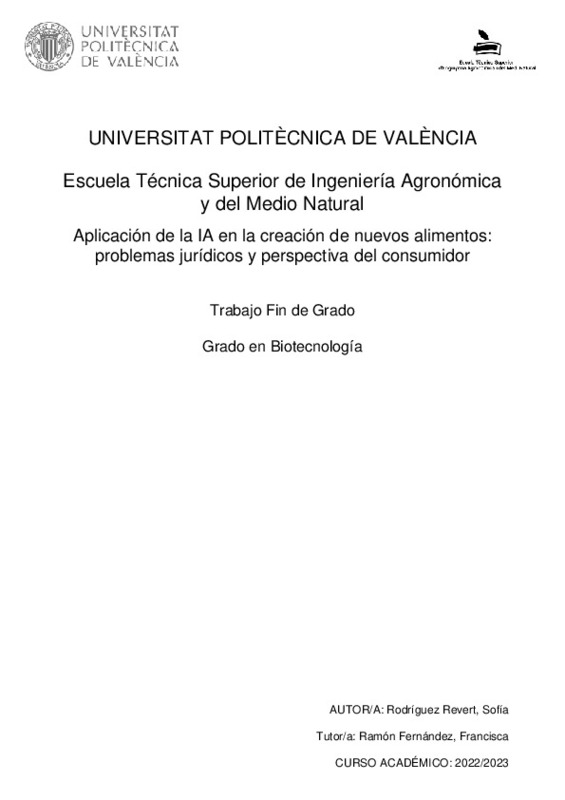JavaScript is disabled for your browser. Some features of this site may not work without it.
Buscar en RiuNet
Listar
Mi cuenta
Estadísticas
Ayuda RiuNet
Admin. UPV
Aplicación de la IA en la creación de nuevos alimentos: problemas jurídicos y perspectiva del consumidor
Mostrar el registro sencillo del ítem
Ficheros en el ítem
| dc.contributor.advisor | Ramón Fernández, Francisca
|
es_ES |
| dc.contributor.author | Rodríguez Revert, Sofía
|
es_ES |
| dc.date.accessioned | 2023-09-06T08:34:58Z | |
| dc.date.available | 2023-09-06T08:34:58Z | |
| dc.date.created | 2023-07-27 | |
| dc.date.issued | 2023-09-06 | es_ES |
| dc.identifier.uri | http://hdl.handle.net/10251/195949 | |
| dc.description.abstract | [ES] En los últimos años, se ha producido un enorme interés en la calidad, producción y consumo de alimentos. Cada vez son más las personas que se interesan por saber de donde procede lo que comemos, que la producción de los alimentos tenga un menor impacto ambiental y que a su vez sea de buena calidad. Debido a esto, las industrias alimentarias están trabajando continuamente para crear alimentos a gusto de los consumidores y mantener la competitividad en el mercado. En el inicio de la cuarta revolución industrial, la industria alimentaria evolucionó notablemente. Empezaron a implantar un modelo de digitalización lo cual dio paso a la aparición de la inteligencia artificial. Esta inteligencia analiza al consumidor y permite poner en el mercado nuevos productos al año en todo el mundo orientados a las necesidades y gustos del cliente. La inteligencia artificial es capaz de escalar las capacidades humanas y analizar gran cantidad de datos para innovar. Gracias a esta herramienta, se puede acceder a millones de fuentes de información y quedarse con toda esta, cosa que el ser humano no es capaz ya que no puede almacenar tanta información. Este proyecto tiene como objetivo analizar como las industrias alimentarias hacen uso de la ingeniería artificial para la producción de alimentos nuevos. Asimismo, se detalla su normativa y la regulación existente para el uso de esta nueva herramienta. El impacto de la ingeniera artificial en la sociedad se analiza mediante una encuesta con el fin de evaluar los conocimientos actuales. Este trabajo se relaciona con los siguientes ODS de la Agenda 2030: Fin de la pobreza; hambre cero; salud y bienestar; energía asequible y no contaminante; trabajo decente y crecimiento económico; industria, innovación e infraestructura; reducción de las desigualdades; producción y consumo responsables; acción por el clima y vida de ecosistemas terrestres y submarina. | es_ES |
| dc.description.abstract | [EN] In recent years, there has been an enormous interest in the quality, production, and consumption of food. More and more people are interested in knowing where what we eat comes from, that the production of food has a lower environmental impact and that it is of good quality. Because of this, the food industries are continuously working to create food to suit consumers and remain competitive in the market. At the beginning of the fourth industrial revolution, the food industry evolved remarkably. They began to implement a digitization model which gave way to the appearance of artificial intelligence. This intelligence analyzes the consumer and allows new products to be placed on the market every year throughout the world, oriented to the needs and tastes of the client. Artificial intelligence is capable of scaling human capabilities and analyzing large amounts of data to innovate. Thanks to this tool, you can access millions of sources of information and keep all this, something that the human being is not capable of since he cannot store so much information. This project aims to analyze how food industries make use of artificial engineering to produce new foods. Likewise, its regulations and the existing regulation for the use of this new tool are detailed. The impact of artificial engineering on society is analyzed through a survey to assess current knowledge. | es_ES |
| dc.format.extent | 40 | es_ES |
| dc.language | Español | es_ES |
| dc.publisher | Universitat Politècnica de València | es_ES |
| dc.rights | Reserva de todos los derechos | es_ES |
| dc.subject | Inteligencia artificial | es_ES |
| dc.subject | Industria alimentaria | es_ES |
| dc.subject | Opinión del consumidor | es_ES |
| dc.subject | Digitalización | es_ES |
| dc.subject | Nuevos productos | es_ES |
| dc.subject | Análisis de datos | es_ES |
| dc.subject | Consumer opinion | es_ES |
| dc.subject | Artificial intelligence | es_ES |
| dc.subject | Food industry | es_ES |
| dc.subject | Consumer preferences | es_ES |
| dc.subject | Digitization | es_ES |
| dc.subject | New products | es_ES |
| dc.subject | Data analysis | es_ES |
| dc.subject.classification | DERECHO CIVIL | es_ES |
| dc.subject.other | Grado en Biotecnología-Grau en Biotecnologia | es_ES |
| dc.title | Aplicación de la IA en la creación de nuevos alimentos: problemas jurídicos y perspectiva del consumidor | es_ES |
| dc.title.alternative | Application of the AI in the creation of new foods: legal issues and consumer perspective | es_ES |
| dc.title.alternative | Aplicació d'IA en la creació de nous aliments: problemes jurídics i perspectiva del consumidor | es_ES |
| dc.type | Proyecto/Trabajo fin de carrera/grado | es_ES |
| dc.rights.accessRights | Abierto | es_ES |
| dc.contributor.affiliation | Universitat Politècnica de València. Departamento de Urbanismo - Departament d'Urbanisme | es_ES |
| dc.contributor.affiliation | Universitat Politècnica de València. Escuela Técnica Superior de Ingeniería Agronómica y del Medio Natural - Escola Tècnica Superior d'Enginyeria Agronòmica i del Medi Natural | es_ES |
| dc.description.bibliographicCitation | Rodríguez Revert, S. (2023). Aplicación de la IA en la creación de nuevos alimentos: problemas jurídicos y perspectiva del consumidor. Universitat Politècnica de València. http://hdl.handle.net/10251/195949 | es_ES |
| dc.description.accrualMethod | TFGM | es_ES |
| dc.relation.pasarela | TFGM\153196 | es_ES |
Este ítem aparece en la(s) siguiente(s) colección(ones)
-
ETSIAMN - Trabajos académicos [3541]
Escuela Técnica Superior de Ingeniería Agronómica y del Medio Natural






